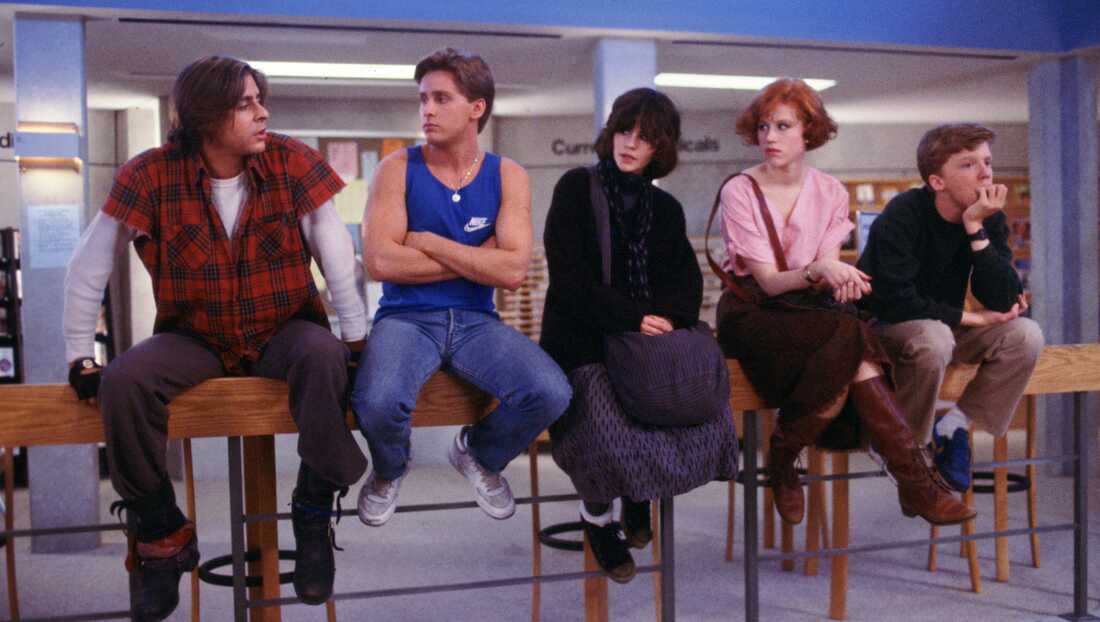The first hour, where dynamics are being established, is appropriately alienating. Battle lines are drawn between jock Andrew and queen bee Claire against weirdo Allison, freshman nerd Brian, and ne’er-do-well Bender, and class lines nudge wealthy Claire and meritocratic Brian against the lower-class Allison and Bender. Claire’s haughtiness, Brian’s casual arrogance, and Andrew’s brutishness are present as negative traits, but are all less surprising than the behaviors of the other two. Allison and Bender both are confrontational in very different ways, with both becoming the most abrasive versions of themselves to ensure no one gets close to them, whereas Brian is thirsty for companionship and Allison and Andrew can’t be bothered. Bender seems a few bad developments away from committing a serious crime, particularly of the sex-pest variety towards Claire. He speaks about her in a dismissive and vulgar way and needles her about her sexual history before eventually groping her while hiding from Vernon. He rips pages out of books to rile Brian and instigates fights with Andrew. For her part, Allison is silent in speech and loud in action. Both she and Bender want to be noticed, but her tactic is to be as weird as possible. A lunch scene involving her is repulsive, and when she finally does speak, it’s bawdy and reaction-seeking.
The Breakfast Club goes out of its way to push the viewer away from its characters and achieves its greatest success by bringing the viewer back. As boredom gives way to honesty, each character reveals more of themselves. For the achievers, the burden of expectations or the social spotlight isn’t some kind of curtain-pulling reveal. Hall and Estevez are each compelling in their agony, however, and Hughes finds small wrinkles to differentiate their stories. Andrew is in detention because he bullied a kid, and is not only ashamed of the bullying itself, but how much social capital he gained from it from his friends and his father. Brain’s there because of the blow to his self-conception due to struggling in shop class, something he thought would be an easy A and a harsh but true mark of his meritocratic disdain for workers. Bender’s reveal of an abusive home is de rigueur, but his character is brittle enough to show how abuse gets passed down and the film leaves it an open question if he can break the cycle or, more likely, perpetuate it. The film’s truest attempt is in its acknowledgment that these teens aren’t stronger than the social system that holds them in place. They’re being open with each other, but things will return to normal at the first opportunity. This lands differently with each character, and it lands hardest with Brian, the youngest and most fragile, in Hall’s best moment.
Hughes wrote several slapstick-y scripts over his career, and those instincts, when they arise, are least appropriate here. The gif-able scenes of the Breakfast Club, like the dance montage that serves as catharsis for the big emotional confrontations, have no place within the film itself. The characters move from wild independent thrashing to the film’s pop punk soundtrack to static camera dance routines. The former is natural and anarchistic: the latter is false and choreographed. Hughes repeatedly undercuts himself in this fashion. In a demonstrative character beat, Allison is shown nonchalantly moving down the hallway as the kids try and evade Gleason. In the following sequence, she’s rattled and hurried like the rest of them. The director has admitted to regretting including a scene where Andrew yells so loud, he breaks a pane of glass, and that regret is warranted. What’s more warranted is rueing the entire ending, which sells out Brian by adhering to his archetypal role of nerd and scoffs at Allison by giving her a prairie princess makeover. Lastly, freeze-frame endings might’ve been all the rage in the 80’s, but sometime between then and now, they became unacceptable and cringe.
The Breakfast Club might’ve blown minds in the 80’s amongst teens who never had the realization that their world is constructed with received wisdom that’s rarely challenged. For the viewer who’s unsurprised by that and finds Hughes’ execution slapdash and full of half measures, the film becomes little more significant than the performances within it. For all his questionable directing and writing choices, Hughes did have a way with young actors and he gets enough out of his cast here to mostly nullify what is irksome about The Breakfast Club. For insight into how teens live, however, this wouldn’t approach the level of profundity in better works that both precede and proceed from it. C+

 RSS Feed
RSS Feed